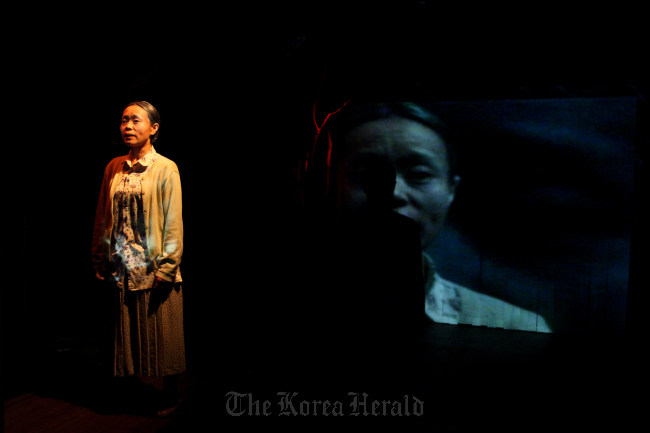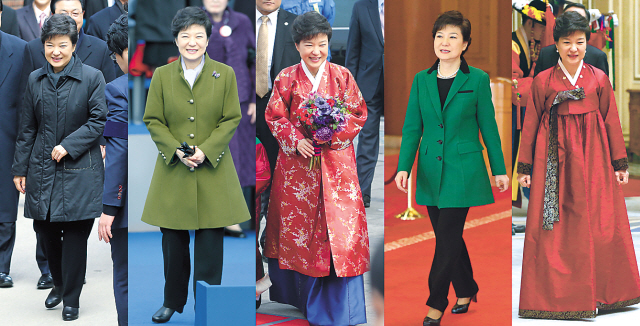Theater troupes present
shows featuring turbulent periods of modern Korean history in the
month of March 1 Independence Movement Day
The month of March opens here with the March 1 Independence Movement
Day, a national holiday dedicated to commemorating the 1919 nationwide
uprising against Japan’s colonization.
The uprising, known as
the March 1st Independence Movement, was one of the earliest public
displays of Korean resistance against Japanese rule ― which ended in
1945 at the end of World War II.
This month, Seoul’s theater
scene is presenting a number of plays featuring the turbulent period of
Korean history. One of them is “Red Poetry” by Theater Company Gorae.
The play deftly links the controversial suicide of the actress Jang
Ja-yeon in 2009 to the stories of elderly women who were forced to be
sex slaves for the Japanese military during World War II.
 |
| A promotional image of Theater Company Gorae’s “Red Poetry” (Theater Company Gorae) |
Jang,
who had just starred in the TV drama series “Boys over Flowers” at the
time, killed herself leaving a seven-page handwritten note claiming she
had been sexually and physically abused by high-profile media
executives.
The play is being told from the perspective of
fictional character Dong-ju (played by Kim Dong-wan), a reporter who is
deeply disturbed by the sudden death of a popular actress, a stand-in
for the late Jang. The story unfolds as he goes to the next world
through a mistake by the angel of death, and meets up with the actress
as well as the former sex slaves who still seek an apology from Japan.
“The victims in the play repeatedly emphasize the importance of speaking out,” said the troupe’s promoter.
“This
play strongly believes in the power of words, as well as speaking out.
The two cases that appear in the play may seem like they have no
relevance to each other, but they do. Those who committed the violence
never properly apologized, and many of us, the public, still remain
silent about what happened.”
Meanwhile, another local troupe,
Mirage Kaleidoscope, is presenting “Flying of a Bee,” which delves into
the Act on the Punishment of Anti-national Activities, established in
September 1948 to punish pro-Japanese collaborators during the Japanese
colonial rule. The act, however, was suspended by South Korea’s first
president Syngman Rhee’s regime ― just before the Korean War in March
1950. Rhee also suspended the execution of those who had been found
guilty.
“The Syngman Rhee government found itself having to
respond to the division into two Koreas by crafting a strong state that
could play an active role in the establishment and maintenance of a
powerful anticommunist system,” writes local scholar Oh Il-hwan, in his
2011 paper “Anticommunism and the National Identity of Korea in the
Contemporary Era: With a Special Focus on the USAMGIK and Syngman Rhee
Government Periods” published in the Review of Korean Studies in 2011.
“Here,
administrative officials and policemen who had gained valuable
experience during the Japanese colonial period would inevitably have
been perceived as useful resources through which to secure such
objectives. … Under such circumstances, the Act on the Punishment of
Anti-national Activities in 1948 to weed out pro-Japanese elements could
only be regarded by Syngman Rhee as a proverbial thorn in his side.”
“Flying
of a Bee” features the court trials of Bae Joeng-ja (1870-1952), a
Korean-born woman who was raised as the adopted daughter of Ito Hirobumi
(1841-1909), who served as Resident-General of Korea during the
Japanese colonial period. He was assassinated by Korean nationalist An
Jung-geun in 1909.
Bae worked with Ito Hirobumi as a spy for the
annexation of Korea by Japan, and became the first female pro-Japanese
collaborator to be arrested by the law enacted in 1948. She was released
upon the suspension of the law in 1950. The spy has been featured in a
number of local films, Jeong In-yeob’s 1973 biopic “Femme Fatale: Bae
Jeong-ja” and Jang Yoon-hyun’s period drama “Gabi” from last year which
dealt with the death of King Gojong (1852-1919).
“We did not
create this play to punish Bae,” said the play’s director Ryu
Seong-cheol. “It’s more about those we could not ― or chose not to ―
make the just decisions about history of the period.”
Meanwhile,
homegrown musical “The Goddess is Watching” concerns itself with the
Korean War (1950-1953) and its brutality. Created by local troupe Stage
Yeonwoo, the show takes place on a remote island during the war. It
tells the story of six different soldiers, some members of the North
Korean army, who end up living together on the uninhabited island after a
shipwreck.
The plot develops as a solider named Soon-ho, the
only member of the group who knows how to fix the ship, suffers from
severe post-traumatic stress disorder after witnessing his brother’s
death in a battle. Another member of the group named Young-beom creates a
story of a beautiful goddess to console Soon-ho and ease his fragile
mental state.
“Everything that happens in the show is
fictional,” said the director Park So-young. “The goddess does not
indicate an actual person or a spiritual being, but symbolizes the
universal femininity. We believed that it can bring an immense healing
and empowering effect in extremely violent and devastating situations
like the war in our history.”
“The Goddess is Watching” runs
until March 10 at Chungmu Art Hall in central Seoul, while “Flying of a
Bee” also runs until March 10 at Kijakeun Sonamu (Little Pines) Theater
in Daehangno, Seoul.
“Red Poetry,” on the other hand, runs from March 22 to March 31 at Daehangno Art Theater, also in Seoul’s Daehangno district.
By Claire Lee (
dyc@heraldcorp.com)
 Cherry blossoms are in full bloom at Busan Baehwa School for the Deaf in the
southern port city on Thursday.
Cherry blossoms are in full bloom at Busan Baehwa School for the Deaf in the
southern port city on Thursday. 
 On her inauguration day, President Park Geun-hye was seen wearing five outfits.
On her inauguration day, President Park Geun-hye was seen wearing five outfits. 






